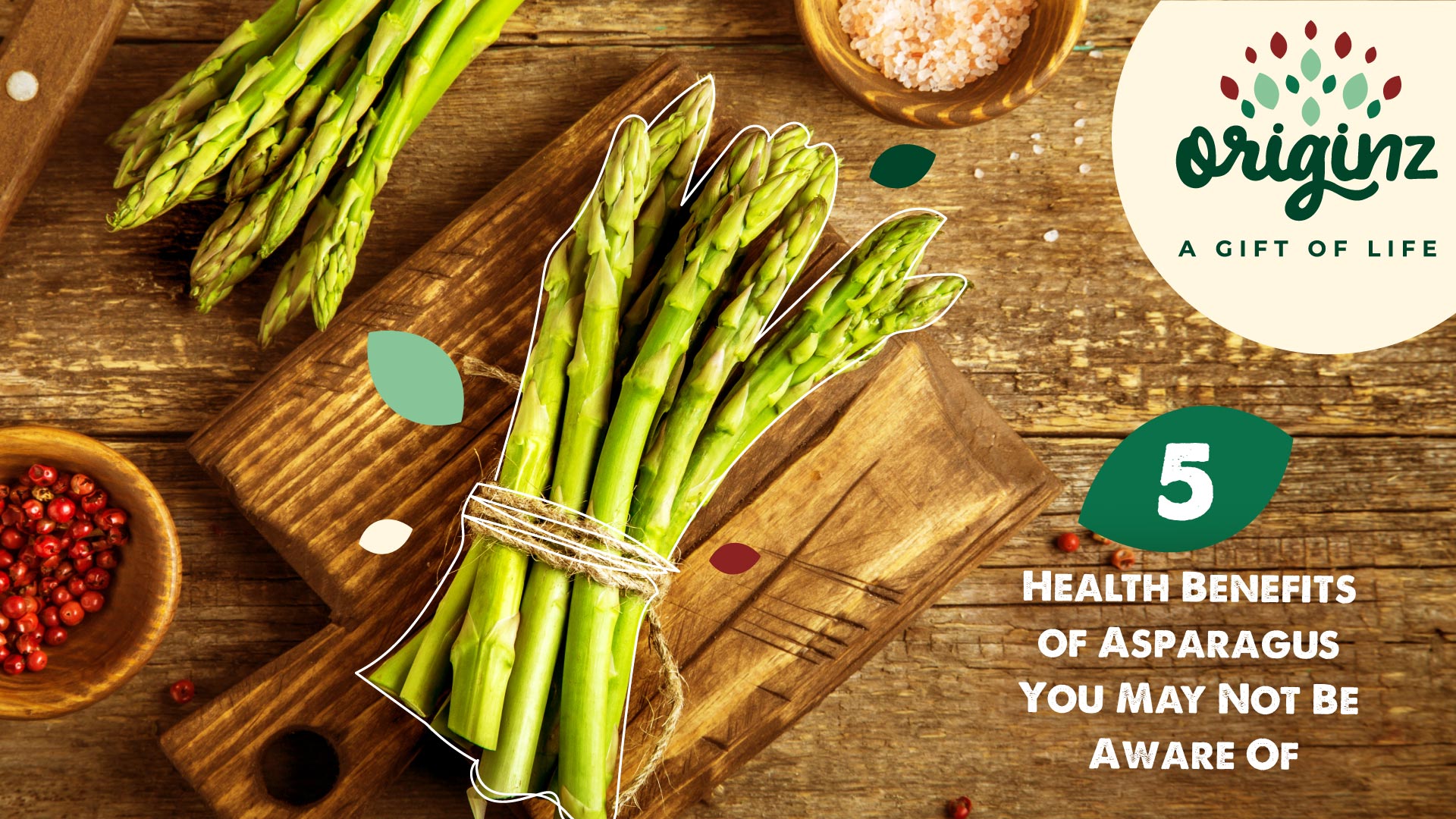
5 Health Benefits of Asparagus You May Not Be Aware Of
Asparagus, a vibrant green vegetable, is a treasure trove of nutrients. This versatile vegetable is packed with vitamins, minerals, and other health properties. These properties give the humble asparagus benefits for men and women that contribute to our overall health and well-being. Let's delve into the numerous health benefits in asparagus and the nutrient value of asparagus.
The Health Properties of Asparagus
Asparagus is a low-calorie vegetable that is high in essential vitamins and minerals, such as vitamins A, C, E, K, B-vitamins, and folate. It also provides a good amount of fibre, which aids in digestion and promotes a healthy gut.
Moreover, asparagus is rich in minerals like iron, copper, calcium, and phosphorus. It also contains a unique compound called asparagine, which serves as a natural diuretic and can help the body get rid of excess salts and fluids.
Vitamins in Asparagus
Vitamin A in asparagus promotes good vision and boosts the immune system. Vitamin C, an antioxidant, helps protect the body against free radicals, while vitamin E supports skin health. Vitamin K is essential for blood clotting and bone health, and B-vitamins, including folate, play a vital role in energy production and brain function.
Minerals and Other Compounds in Asparagus
The iron in asparagus is crucial for the production of red blood cells, while copper aids in energy production and iron absorption. Calcium and phosphorus contribute to strong bones and teeth, and the asparagine in asparagus acts as a natural diuretic, helping to reduce bloating and support kidney health. This chemical can give urine a particular odour, but this is nothing to worry about.
Health Properties of Asparagus Vegetable: Benefits for Men and Women
Asparagus offers a myriad of health benefits for both men and women. From supporting heart health to promoting healthy digestion, this nutrient-dense vegetable plays a significant role in maintaining overall health.
Furthermore, asparagus has properties that can help in weight management, improve mental health, and even contribute to a healthy pregnancy. Let's explore these asparagus plant benefits in more detail.
Heart Health
Asparagus is rich in fibre and B-vitamins, which can help lower the risk of heart diseases. fibre helps reduce the amount of cholesterol absorbed into your bloodstream, while B-vitamins, particularly folate, can lower levels of a compound called homocysteine, high levels of which are associated with an increased risk of heart disease.
Digestive Health
The high fibre content in asparagus aids in healthy digestion by adding bulk to stool, preventing constipation, and maintaining a healthy digestive tract. Moreover, asparagus contains a type of fibre called inulin, which serves as a prebiotic and promotes the growth of beneficial gut bacteria.
Weight Management
Asparagus is a low-calorie, high-fibre vegetable, making it a good choice for those looking to manage their weight. The fibre content can help you feel full, reducing the likelihood of overeating, while the low calorie count makes it a guilt-free addition to any meal.
Mental Health
Asparagus is a good source of folate, a nutrient that can help regulate mood by controlling the body's level of homocysteine. High levels of homocysteine can inhibit the production of the mood-regulating neurotransmitters serotonin, dopamine, and norepinephrine, leading to feelings of depression and anxiety.
Pregnancy Health
The asparagus benefits for females extend to babies as well. For instance, the high folate content in asparagus can support a healthy pregnancy. Folate is essential for the formation of the neural tube during early development and can help prevent major birth defects of the baby's brain and spine.
FAQs
What types of asparagus are there?
There are a variety of types of asparagus, including green asparagus, purple asparagus, and white asparagus. All have a distinct taste profile and nutritional profile, as well as looking distinctive in their own ways.
How do I find good asparagus?
You can tell if asparagus is good if it is a little firm and snaps when bent. The colour should also be vibrant and the tips not too open. The best asparagus, of course, will come from your local organic food store, since organic food is often higher in nutrients than processed food and food that is farmed unsustainably.
How do I include asparagus in my diet?
There are many ways to cook asparagus. You can enjoy asparagus boiled, roasted, grilled, or even on their own in a vegetable salad. For more inspiration, look to the Originz collection of delicious recipes!
Asparagus is a nutrient-dense vegetable that offers a multitude of health benefits for both men and women. Its rich content of vitamins, minerals, and fibre contribute to heart health, digestive health, weight management, mental health, and pregnancy health. Incorporating asparagus into your diet can be a delicious and healthy way to boost your nutrient intake and promote overall well-being.
So, whether you enjoy it steamed, roasted, or grilled, asparagus is a versatile and nutritious addition to any meal. Enjoy these wonderful asparagus vegetable benefits today!
Further Read,
Latest Blogs

Maintaining Healthy Habits After Ramadan
Have Ramadan healthy meals after Ramadan and maintain healthy food habits and implement them in your daily lives. Read more about healthy food habits.

Authentic Middle Eastern Iftar Meals to Prepare This Ramadan
Prepare some authentic middle eastern iftar meals this Ramadan. Look for fresh Ramadan food ideas and make your day memorable with these dishes. Check them out.

Ramadan Dishes to Cure Fasting Fatigue
Don’t worry about fasting fatigue anymore as we have listed some best Ramadan dishes and easy iftar meals to support your fasting journey. Check them out.

Eid-al-Fitr Feast: Delicious Recipes to Celebrate the End of Ramadan
Celebrate the end of Ramadan with delicious recipes on the eve of Eid ul Fitr. Read more about the traditional Ramadan recipes and make them easily.